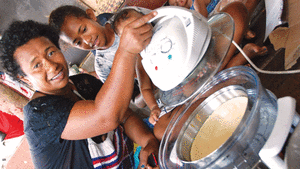What is true poverty? Robert Granger thought he knew until he encountered true generousity.
I am typing this while travelling from Can Tho, in the heart of the Mekong Delta in Vietnam, to Ho Chi Minh City. Even with music playing from my laptop's CD player and cool air blowing from the minivan's air conditioner, I am still uncomfortable.
As I gaze out the window and reflect on the past I0 days of frantic activity during my work ‑ related visit to Vietnam, my attention is constantly diverted to the reality TV program unfolding before my eyes. There are the motorbikes—and more motorbikes. Children jumping from a bridge into a chocolate ‑ coloured river. An elderly lady selling a litre of petrol in an oft-recycled soft drink bottle.
A young boy sporting a Dodgers baseball cap fixing a client's motorbike tyre. A group of primary school ‑ aged girls riding bicycles while holding their white ao dai from becoming caught in the wheels. A middle ‑ aged man hauling a load of bananas on a tricycle—a load that wouldn't possibly fit in the boot of my Honda Accord. So many people, and all eking out an existence with amazing tenacity, resourcefulness and apparent contentedness.
And that is partly why I am feeling so uncomfortable. As a visitor from an affluent country, I can't help but notice that Vietnam is a desperately poor country.
No formal publications are needed to inform me that the average Vietnamese has a standard of living considerably lower than what we experience in Australia or New Zealand. The 2004 World Bank estimates of per capita income puts Vietnam at $US550 per year compared with $US27,000 in Australia. Yes, many things are more expensive in Australia, but there is no question that my $27,000 goes much further than their $550. I feel lucky. Fortunate is a better word. No, blessed is even better.
While travelling on the same road toward Can Tho five days previously, I watched a few segments of a DVD written and produced by Alain de Botton entitled Status Anxiety . It's an incredibly challenging documentary revealing the lengths to which we go in order to be noticed and respected by our peers. De Botton concludes the series by saying, "Whatever our status, we are all fated to end up as that most democratic of substance— dust... . If there is something strangely calming in the idea that we are all going to die, it's perhaps that there is something in us that instinctively recognizes how many of our worries are bound up with things that are, in the wider scheme, pretty petty concerns.”
My views from inside the minivan are starting to blend with the wisdom of de Botton and the memories of my experiences in this amazing country. Moulded by a heritage of relative prosperity and influenced by a biblical and Adventist philosophy of stewardship, my conscience is in overdrive.
But should I suggest that the Vietnamese are not lucky, not fortunate or not blessed? Far from it. During a prior visit to Can Tho two years ago, I was able to track down a Seventh ‑ day Adventist congregation to visit on Sabbath. As I soon learned, it is only one of seven SDA churches licensed to operate in Vietnam, all located to the south of Da Nang.
There are I0 church pastors recognised by the state. Members of illegal home churches conduct their clandestine activities under the pain of fines and imprisonment.
Pastor Duong Quang Thoai and his wife Phuong Mai welcomed me into their home, which also doubled as one of the approved churches. They informed me that the rubble at the front door was to be the site of a long ‑ anticipated church building.
One year after that visit, their new church building is now completed. Following their worship service on this particular week, the members literally smashed some clay piggybanks onto an outstretched canvas. I asked for more details about this interesting ceremony.
Pastor Thoai informed me that the church members have been saving for months to provide a special gift for the “poor persons” in their community. For a few seconds, I could not say anything for fear that my emotions may embarrass me. Poor persons? The givers are poor persons! The jagged parched clay lying heaped on the canvas gave rise to a river of money that came to an unbelievable sum of $US200. Thoughts of that widow's mite came to mind, and I began to understand that we can never be too poor to give of our means.
A strange turn of events indeed. I came to Vietnam at the behest of the Ministry of Health and the World Health Organisation to assist with identifying strategies to reduce the burden of diseases such as diabetes, cancer and heart disease. But I leave as a young and ignorant Aussie who has much to learn about generosity, and the true definition of poverty.






